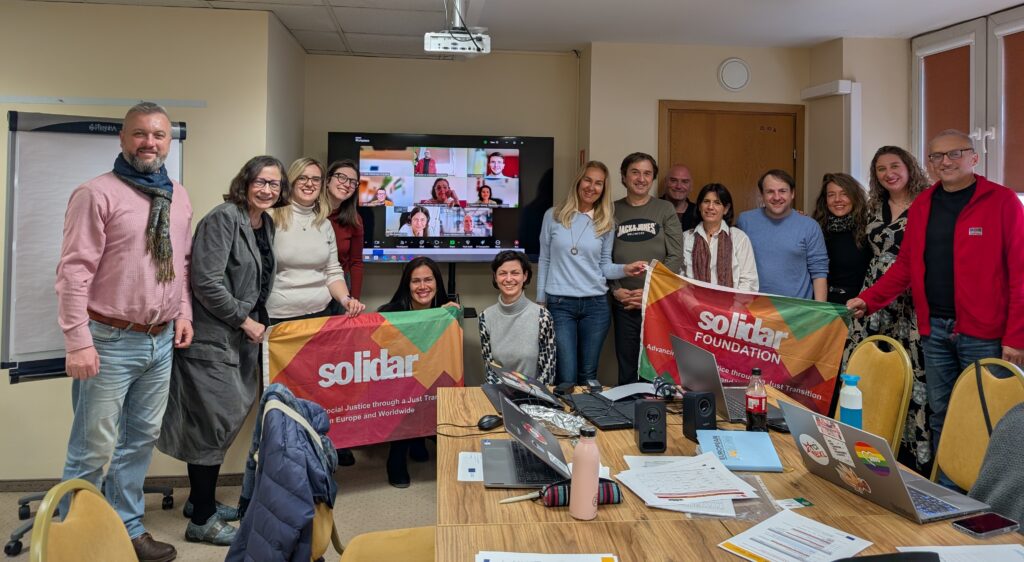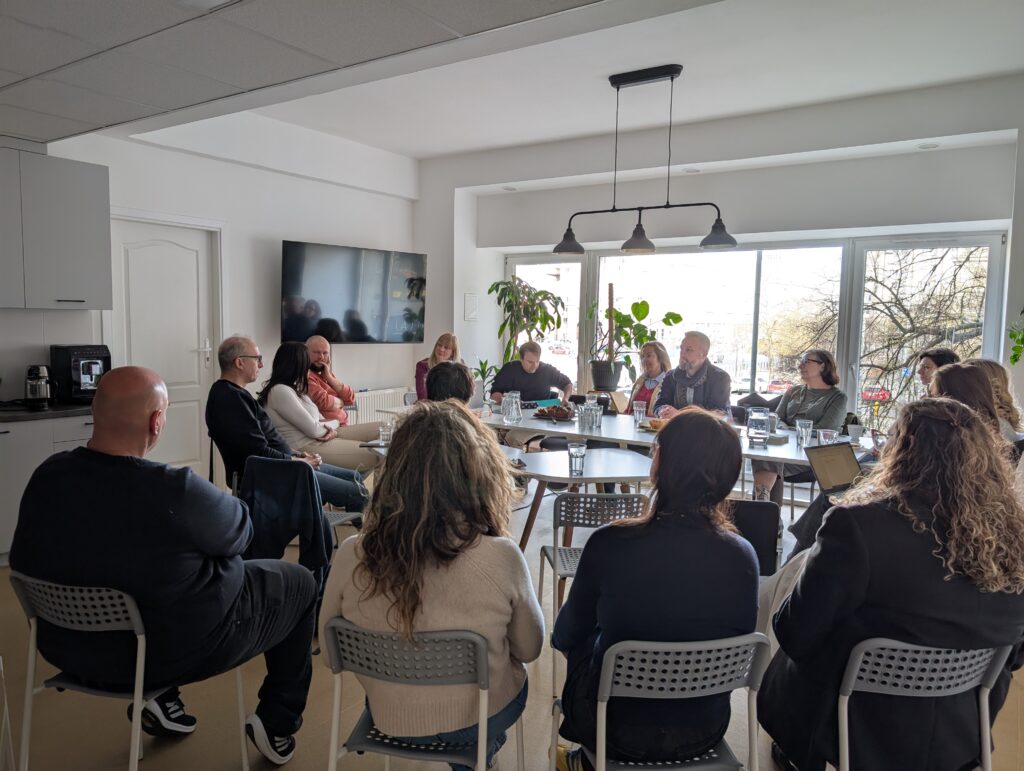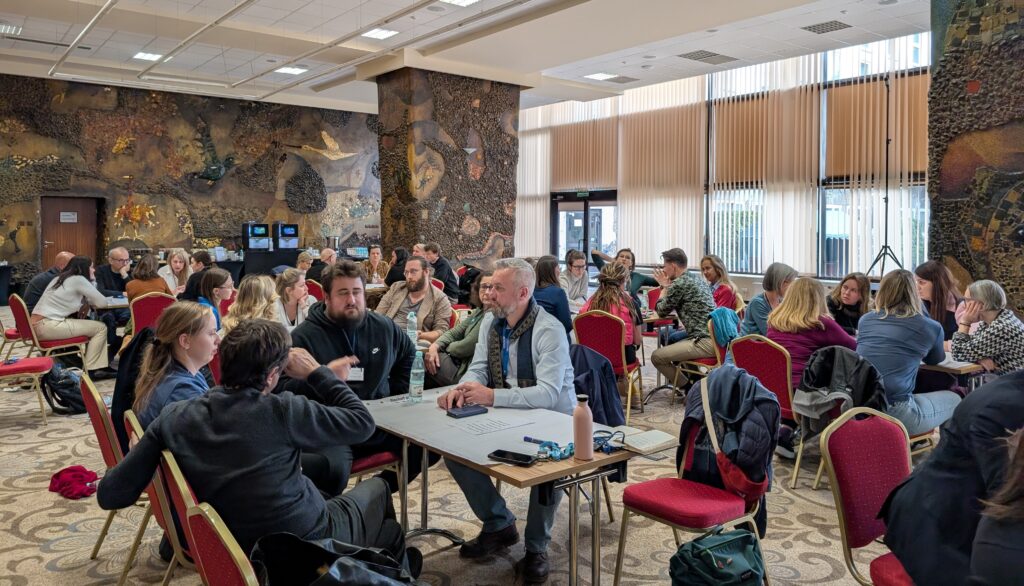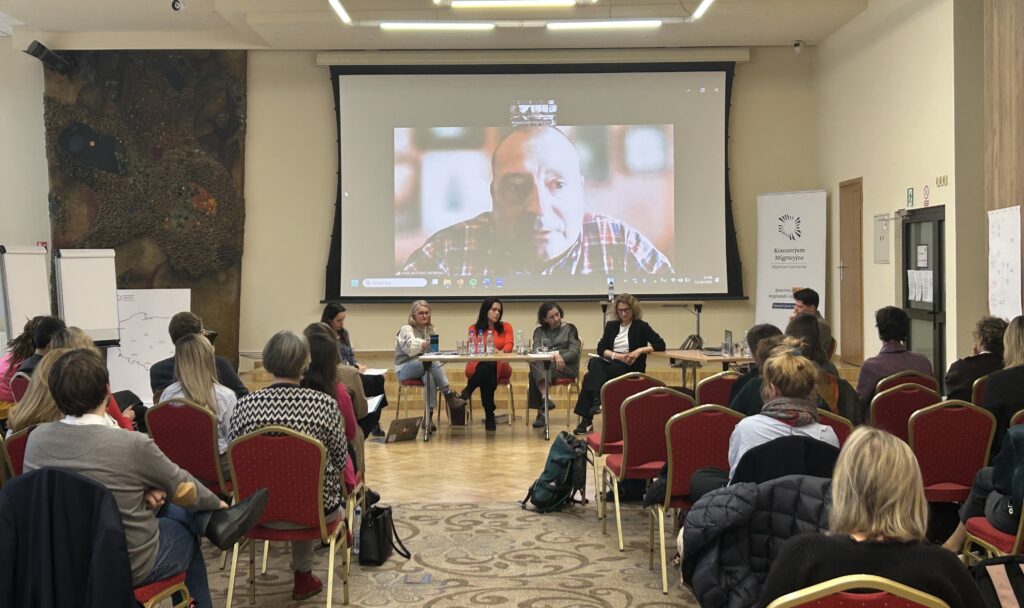Study Visit to Warsaw – Newcomers participation in civic and political life
From 9th to 11th April, delegations of SOLIDAR and SOLIDAR Foundation (SOLIDAR) and their members were happy to visit School With Class Foundation and Konsorcjum Migracyjne in Warsaw, Poland. The two-days journey focused on encouraging newcomer participation in civic and political life to strengthen social inclusion.
The programme started with a Social Affairs and Education and Lifelong Learning Forum meeting which looked among other things at the next EU Multiannual Financial Framework and the European Commission Work Programme.

Education as a driver of social change – visit to School With Class Foundation

On the second day, 10 April, the delegation had the privilege to be hosted by School With Class Foundation (SWCF). SWCF started as a project for teachers to learn better, as it is common for teachers in Poland to finish their teaching career without having received a single training past the initial training. SWCF’s goal is to drive social change with education, working with teachers in schools. Their work cover the thematic areas of Digital citizenship, Social awareness and engagement, Thinking and understanding the world, Open and engaging learning environment, and Wellbeing, mental and physical health. SWCF works applying the Universal Design for Learning approach as well as design thinking. Agata Łuczyńska presented us DIGHIST, a project on Digital Historytelling across Belgium, Spain and Poland, looking at shaping common European narratives of the 20th century, by looking at what migrant children learn about the history of their host country.
The discussion was extremely enriching, giving the SOLIDAR delegation a better grasp of the Polish context working on education. Welcoming huge numbers of Ukrainian refugees was a real challenge for Poland, a very homogeneous society before 2022 – and in fact a striking 84% of Polish teachers reported never having worked with foreign students. With Russia’s war against Ukraine, Poland has shifted towards a bi-cultural society. English is still a barrier for many teachers. The conversation also touched on the civil society landscape in the country: highly fragmented and underfunded, which is in contrast with the onset of the war when and huge amounts of money flowed in from international donors to Polish CSOs.
Sixth Cooperation & Integration Forum with Migration Consortium
On 10 April lunchtime, Konsorcjum Migracyjne (Migration Consortium)’s Integration and Cooperation Forum started. This sixth edition was the first co-organised by an international partner, namely SOLIDAR. SOLIDAR and Migration Consortium collaborated in particular on the last two panels, through the activity ‘Social Rights Ambassadors’.
The Forum featured a rich programme, starting Day 1 with a presentation and discussion on Poland’s experience with humanitarian response. The discussants shared their observations and experiences of the two main emergency responses Poland had to provide in the past five years – at the border with Belarus and at the border with Ukraine, highlighting the double standards in those two experiences. The Forum then moved on to a bilingual strategic workshop on drawing lessons learnt from experiences of crisis management, to inform and allow for readiness for future actions.The first day of the Forum ended with a very nice ‘Failure Show’ during dinner, with volunteer participants sharing experiences of personal or organisational failures and a light and cheerful spirit.

On Day 2 of the Forum, professionals and volunteers gathered in the morning for a workshop on mental resilience in support organisations and a reflection on the influence of thought strategies on organising. This was followed by a ‘Flying Academy’ a dynamic session during which the participants self-organised four thematic roundtables. They dealt with issues of exploitation of people migrant at work and accommodation, women’s leadership, the situation of LGBTQI+ refugees in Poland and legal challenges faced by people with migration experience.
The last section of the Forum was devoted to the topic of integration and inclusion. First took place the panel discussion organised by SOLIDAR, chaired Julie Martinaud, SOLIDAR Policy Officer for Migration and Inclusion. Titled ‘Fostering meaningful participation of newcomers in civic and political life’, it gave space to a academics, civil society leaders and a Trade Union representative including three SOLIDAR members to present promising practices and discuss avenues for political change on civic and political participation of newcomers. The main elements of that discussion are recapped below. Finally, the Forum closed on a panel chaired by Migration Consortium, with the participation inter alia of SOLIDAR members Fausto Melluso, from Arci, and Maria José Moreno Molinero, from MPDL. The conversation touched on among others, equal opportunities, protection of minority rights, counteracting social exclusion and the role of the EU in supporting integration.
Social Rights Ambassadors: Fostering meaningful participation of newcomers in civic and political life – a vector of social inclusion
We approached that concept in the broad sense of individual or collective activities addressing public collective issues and promoting the well-being of a community or society. Civic and political participation is a crucial aspect of migrant and mobile citizen’s inclusion in host societies. In fact, evidence demonstrates that higher levels of migrant political participation fosters more positive attitudes toward immigration among the national population, as it is perceived as a sign of successful integration. At the same time, it is a cornerstone of healthy democratic societies, to ensure that their laws and policies are representative, and to that objective, that all their residents can participate in shaping the society they live in and policies that will affect them.

Prof. Magdalena Lesińska, Centre of Migration Research University of Warsaw highlighted the main barrier to foreign residents’ political participation is legal, as by law non-Polish citizens cannot stand in elections and non-EU cannot vote even in local elections. Other barriers she mentioned are language, discrimination and an anti-immigrant narrative.
Myroslava Keryk, from organisation Ukrainian House, recognising that letting non-citizens with long-term residence stand in elections and therefore act in politics is the end goal, suggested to include non-citizens at different levels in councils and advisory boards in the meantime, so their voices are represented. She advised not to disregard but instead to address the fears of the hosting community in that process.
Erica Acosta, independent lawyer consulting for Rede Sem Fronteiras (Portugal) underlined a disconnect that can be observed between actions taken ‘for’ immigrants and their actual needs, and the demands of CSOs representing them. To move from policymaking ‘for’ to policymaking ‘with’, political inclusion is crucial. Through their Campaign Votamigrante in 2024, Rede Sem Fronteiras’s Portuguese member Casa do Brasil Lisboa raised awareness in the diaspora with recently acquired nationality, about the importance of voting, and how diasporas can vote for their fellow citizens who do not have Portuguese nationality.
Dr. Susanne Drake, Willi-Eichler Akademie (Germany), detailed the situation in Germany. When in the past the government took action to facilitate access to citizenship, there are now talks to revoke the citizenship of groups that benefited from this facilitation. Half of the young population in Germany has a migrant background, so it is in everyone’s interests to ensure they receive political education is crucial, as they will have an important weight in deciding the future of the country.
José Antonio Moreno Díaz, confederal lawyer, legal advisor and policy officer at Spanish trade union Comisiones Obreras (CCOO), on matters of immigration and asylum, explained how CCOO pioneered a social dialogue on labour migration through the tripartite labour commission in Spain. In Spain, migration is dealt with as a social issue, not an internal security issue. José Antonio also works towards acceptance of migration as a positive reality at the European level, in his capacity as EESC member.
The discussion with the audience highlighted that:
- What is still needed is that those consultation actually meaningfully follow up on the demands of migrants and CSOs representing them, as too often they’re just a ticking the box exercise. Participation must also go beyond consultation, but towards structural participation and co-design.
- It is crucial to provide new citizens tools to vote consciously, as it’s observed that some migrants reproduce the anti-migrant discourse.
- CSOs have a crucial role to play, as well as deliberative forms of democracy. Far from being a second-rate version of political participation for immigrants lacking full citizenship rights, those participatory forms of democracy are an essential way include foreign residents in shaping their future.
Those activities were organized in the framework of SOLIDAR’s programme ”Realising Social Europe for All and With All”, supported by the European Union, through the EaSI strand of the ESF+ programme.


